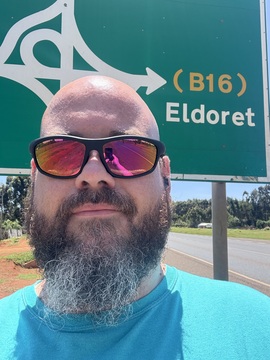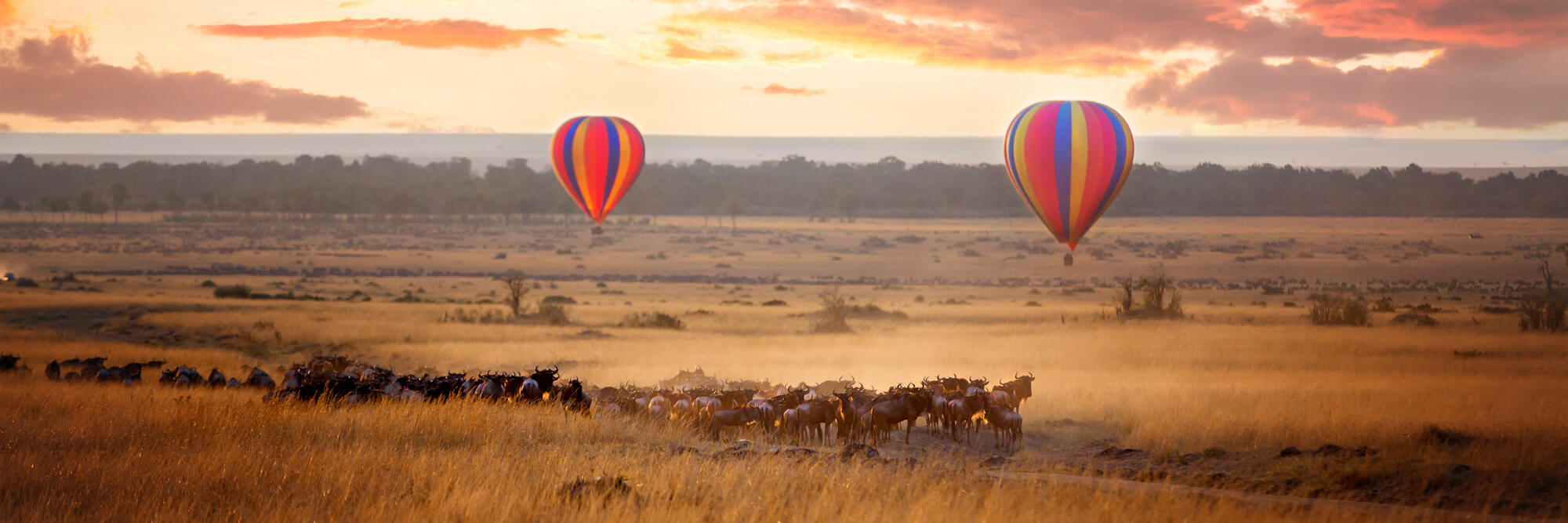Matt is an American college student who moved to Kenya in early 2025 to live with a woman he met on an online dating site. He is continuing his studies remotely and hopes to work as a sociologist in the future. He shares his views on culture, society, and sociology on his website Disrupt Norms.

About Matt
Q: Where are you originally from?
A: The USA.
Q: What country and city did you move to?
A: Eldoret, Kenya.
Q: When did you move?
A: March 2025.
Q: Is this your first expat experience?
A: Yes.
Q: Did you move here alone or with a spouse/partner or family?
A: Alone.
Q: Reason for moving?
A: I met a wonderful woman on OK Cupid and wanted to see if the connection was real. I have been living with her in Eldoret, Kenya, since March.
Living in Eldoret
Q: What do you enjoy most about Eldoret and Kenya in general?
A: The cost of living difference is phenomenal. I’m able to set aside a good chunk of my monthly income in order to save for the future, like owning a house and travelling. The people of Kenya have been very welcoming and accommodating.
Q: Have you had any low points? What do you miss most about the US?
A: Where are the tacos?! It can be difficult adjusting to not having something you’re used to. I’ve learned to make a lot of things from scratch in the kitchen since I can’t even find them at Naivas. I miss driving as well, but my one experience here tells me I shouldn’t try again without taking a local driving class. It’s also really strange to walk down the street and hear people call out, “Mzungu!” and want your attention, sometimes just for a brief conversation and sometimes for money. It can be an utter delight to see a child’s face light up at seeing their first white person, and absolutely draining to be followed around by children who just stare, as well.
Q: What misconceptions about Kenya, if any, have you learned were not true?
A: Kenya is more modern and less dangerous than American media would have you believe.
Q: What are the biggest adjustments you had to make when settling into expat life in Eldoret? Did you experience culture shock at all?
A: Culture shock was huge, but brief. I had never lived anywhere where gated residences and businesses were such a thing, nor had a bomb inspection while driving to the mall, or seen police with machine guns standing outside of banks. Negotiating for goods and services comes slowly to me, as does hiring someone to do my laundry by hand, since we don’t have a washer and dryer.
Q: What are your favourite things to do on the weekend? Any particular places or experiences you’d recommend to fellow expats?
A: Torok Falls is an amazing, if challenging, hike (6km in distance and about 33+ stories of height climbed). Kisumu offers some gorgeous sunsets over Lake Victoria, and the Impala Sanctuary there is a pleasant walk. I love to get out with my fiancé and go ambling through nature, and there’s plenty of it in Kenya to see.
Q: What’s the cost of living in Eldoret compared to the US? Are there specific things that are especially expensive or cheap there?
A: I pay less than USD 300 for a three-bedroom, two-bathroom home in a gated community with active security guards 24/7. In the US, I was looking at USD 900-1200 just for a one-bedroom apartment. Food is also cheaper if you eat like a local, buying fresh fruits and vegetables from roadside stands that are very short walks away. My water bill in Kenya is about USD 2 per month, and electricity, using pre-paid meters, comes to about USD 25 – both significantly cheaper than I was paying in the US.
Q: What’s public transport like in Eldoret and across Kenya?
A: I usually use Wasili, the Kenyan version of Uber, to get everywhere. It’s really cheap. They’re often willing to hire out for the day if you need to make longer journeys or multiple stops, and can be negotiated with. Public transit usually comes down to matatu, which is a crowded van with a set route and some aggressive driving. They go short and long distances and can take you across the country.
Q: What do you think of the healthcare available in Eldoret? What should expats expect from local doctors and hospitals?
A: There are multiple hospitals here that come with varying degrees of skill and service. When I picked up a stomach bug my first month here, I went to the county hospital and was treated, including labs and medicine, in under two hours and for less than USD 50 out of pocket. Completely better in two days.
Q: What’s the standard of housing like in Eldoret? What different options are available?
A: You can get really modern places or really slummy ones, depending on what you’re willing to spend and risk.
Q: Are there any areas or suburbs you’d recommend for expats to live in?
A: Unity Homes in Kapsaret is really nice and affordable. More expats live in Elgon View, where the homes are even larger and more expensive.
Meeting people and making friends in Eldoret, Kenya
Q: Was meeting people and making friends in Eldoret easy? How did you go about meeting new people?
A: I’m still struggling with this! I have a gym membership, and I am joining a biking club. If you’re the kind of person who goes clubbing, there are lots of nightlife options. You can also find classes, like one-off painting classes, to meet people.
Q: Have you made friends with locals, or do you mix mainly with other expats? What advice would you give to new expats looking to make friends with the locals?
A: There aren’t a lot of expats in Eldoret. I’ve mostly met other locals.
Working in Eldoret, Kenya
Q: How easy or difficult was getting a work permit or visa? Did you tackle the visa process yourself, or did you enlist the services of an immigration consultant?
A: I am disabled, so I don’t have a work visa.
Q: What is the economic climate in Eldoret like?
A: There are a few bigger businesses here, but most people seem to get by on subsistence farming, running small shops, or being bodaboda or Wasili drivers. For a population of nearly half a million people, I was shocked to see how little real industry there was.
Q: How does the work culture in Kenya differ from that in the USA?
A: Get used to Swahili time. If someone says they will meet you at 3pm, they mean they will start getting ready to meet you at 6pm. Unless there’s alcohol involved, in which case they will be on time or early. I have been very frustrated, as an American, with the looseness played with times and appointments.
Final thoughts
Q: Any advice you’d like to offer to new arrivals in Eldoret?
A: Be willing to adjust and live as much like a local as possible. Learn the language(s). English is the official language, and in the urban areas, you can probably get by, but most people prefer to speak their mother tongue (a tribal language), or if they have to, Swahili. Expect that their Swahili is not going to be formal, but littered with words from their mother tongue and English or the unofficial Sheng slang that’s popular among Gen Z.
►Interviewed in March 2025



